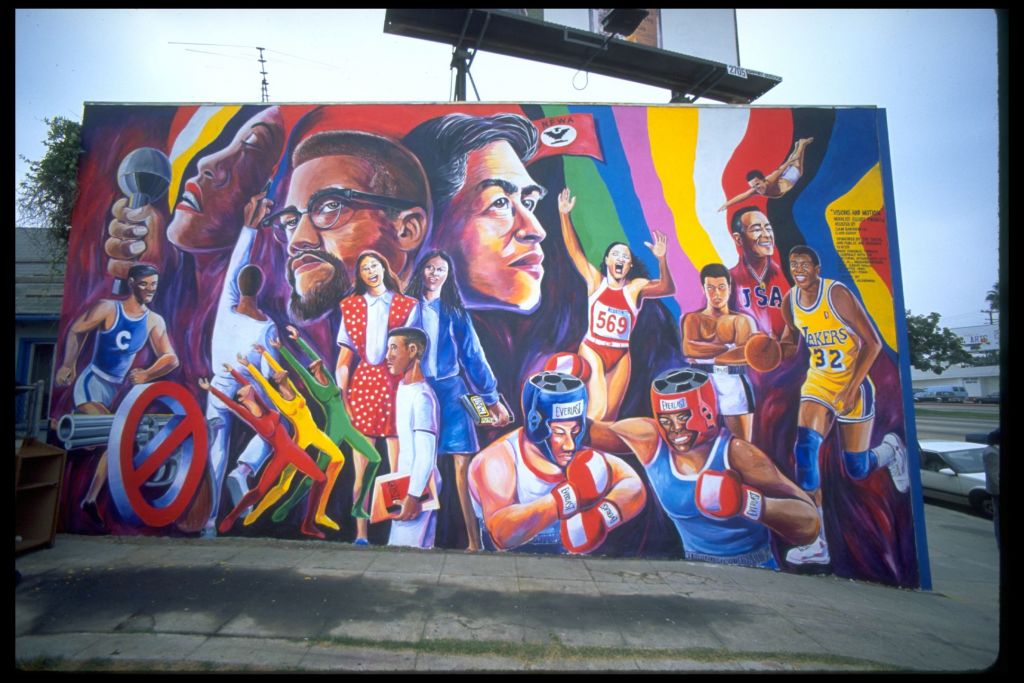
Elliott Pinkney, 1993. Mural, Crenshaw Blvd. Los Angeles.

By William D. Parham, Ph.D.
It has been said that a person will never see their reflection in running water. It is only when the water is still will their reflected image begin to emerge! Black History Month, formerly Negro History Week (launched in 1926), is an annual celebration of Black life in America and throughout the African diaspora. It represents a time to pause and reflect on the significant and substantial contributions, across time, of African Americans in all walks of life including but not limited to medicine, science, engineering, mathematics, education, politics, law, civil rights, media, the arts, agriculture, astronomy, literature, psychology, theology, technology, athletics, and as inventors.
Carter G. Woodson, Ph.D., is known as the Father of Black History. He is also the co-founder of the Association for the Study of African American Life and History (1915) and founder of the Journal of Negro History (1916). Throughout his illustrious career as an educator, author, and journalist, Dr. Woodson remained steadfast and intentional relative to educating African American students about ‘their’ history and sharing information with them that more accurately reflected their ever-evolving journeys as difference-makers. His lifelong work illuminated critical omissions about African American contributions to the making of America and in doing so exposed myriad false narratives, authored largely by White historians and complicit allies, that were promoted as believable ‘truths’.
As I reflect during Black History Month, I am reminded of the genius evident in the courageous, deliberate, and ‘dare-me-to-do-it’ attitude in Dr. Woodson and countless other distinguished African American and African pioneers including Martin Luther King Jr., W.E.B. Dubois, Harriet Tubman, Rosa Parks, Shirley Chisholm, Supreme Court Justice Thurgood Marshall, James Baldwin, Maya Angelou, Mae Jemison, Ralph Bunche, and Cheikh Anta Diop, to name only a few. Their individual and collective wisdom and knack for acute mental discernment can’t be overstated. Their brilliance was not solely in their individual and collective abilities to cull fact from fiction; they had a special talent and aptitude for showcasing Black excellence by unmasking must-be-considered-observations about America’s race relations.
A key observation is framed in the following question: Has America failed at addressing oppression and race-hatred or, has America succeeded at not addressing the social maladies, choosing instead to maintain status quo? A second observation reminds us that ‘ism-ideological’ philosophies and practices (e.g. racism, sexism, ableism, homophobia, xenophobia) in America and throughout the world continue to be pervasive and unrelenting. Said philosophies and practice are grounded in assertions about inferiority, lack, and deficiencies in all groups characterized as non-White males. And, these assertions need to be confronted.
Let’s consider, for example, that logical and predictable responses to assertions of deficiencies and inferiorities would not prompt all-out embraces of socially sanctioned systems of oppression and targeted and strategic assaults on equal rights, equity, and fairness. Hate-force is not exerted on persons and communities declared defective, deficient, innately fragmented and from whom there is no perceived threat. Hate-force is perpetrated against persons and communities who possess a threatening level of mental, physical, and moral strengths that are beyond measure and that can never be fully contained.
In closing, the sagacious curiosities of our aforementioned pioneers and their life-altering discoveries from which we continue to benefit, merits recognition expressed in honoring a daily challenge framed in the following question:
“What can I do today that is better than I did yesterday, knowing that it may not be as good as what I will do tomorrow”?
William D. Parham, Ph.D., ABPP, is professor of counseling and interim associate dean of faculty in the LMU School of Education.
OIA Buzz
- Quote of the Month: “Every great dream begins with a dreamer. Always remember, you have within you the strength, the patience, and the passion to reach for the stars to change the world.” – Harriet Tubman
- D & I Quick Tips: Microaggressions
- MARK YOUR CALENDARS: Don’t forget to REGISTER for an Implicit Bias workshop this spring. In each workshop, we explore how implicit biases form in our brains, their impact on other people and society, and strategies we can take to mitigate the implicit biases that we all possess. Join us in March and April:
- Wednesday, March 18, 10 a.m.-noon – Center for Teaching Excellence UNH 3000
- Thursday April 2, 2 p.m.-4 p.m. – Center for Teaching Excellence UNH 3000
- FOR GRADUATE STUDENTS: Register here
- Monday, March 16, 5:30 p.m.-7:30 p.m. – McIntosh Center, UNH 3999
- Tuesday, March 24, 5:30 p.m.-7:30 p.m. – Center for Teaching Excellence UNH 3000
- INCLUSIVE EXCELLENCE GRANT PROPOSALS– due March 6, 2020
- CULTURAL CONSCIOUSNESS CONVERSATIONS: Increase your comfort level and build community with faculty, staff, and administration. Learn about the program and apply for next year’s cohort.
- CALL FOR PARTICIPANTS: Cabinet Associates 2020. We are currently accepting nominations for OIA’s Cabinet Associates program (formerly “SVP Fellows”) — submissions will be due on March 2. Please contact joseph.bernardo@lmu.edu for more information.
- VISIT LABAND ART GALLERY: Laband Art Gallery presents “Caravan,” a collaborative art installation by Mexican artist Betsabeé Romero that focuses on human migration. The exhibition runs from Jan. 25 through March 28. Additional live performances enhance the exhibit.
- STAY CONNECTED: Follow us on Twitter @LMU_OIA! #StrengthenDiversity #OIASpotlight



